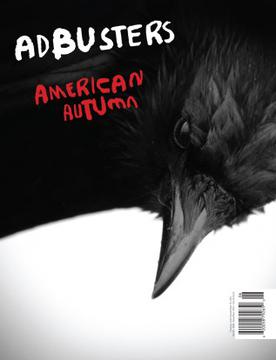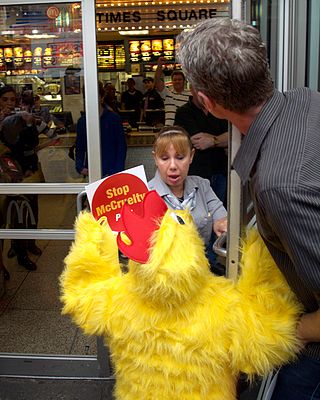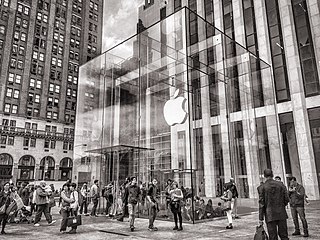
The Adbusters Media Foundation is a Canadian-based not-for-profit, pro-environment organization founded in 1989 by Kalle Lasn and Bill Schmalz in Vancouver, British Columbia. Adbusters describes itself as "a global network of artists, activists, writers, pranksters, students, educators and entrepreneurs who want to advance the new social activist movement of the information age."
Ethical consumerism is a type of consumer activism based on the concept of dollar voting. People practice it by buying ethically made products that support small-scale manufacturers or local artisans and protect animals and the environment, while boycotting products that exploit children as workers, are tested on animals, or damage the environment.

The Estée Lauder Companies Inc. is an American multinational cosmetics company, a manufacturer and marketer of makeup, skincare, perfume, and hair care products, based in Midtown Manhattan, New York City. It is the second largest cosmetics company in the world after L'Oréal. The company owns a diverse portfolio of brands, including La Mer, Jo Malone London, Clinique and Tom Ford Beauty, among many more, distributed internationally through both digital commerce and retail channels.
Internet activism involves the use of electronic-communication technologies such as social media, e-mail, and podcasts for various forms of activism to enable faster and more effective communication by citizen movements, the delivery of particular information to large and specific audiences, as well as coordination. Internet technologies are used by activists for cause-related fundraising, community building, lobbying, and organizing. A digital-activism campaign is "an organized public effort, making collective claims on a target authority, in which civic initiators or supporters use digital media." Research has started to address specifically how activist/advocacy groups in the U.S. and in Canada use social media to achieve digital-activism objectives.
Economic activism involves using economic power for change. Both conservative and liberal groups use economic activism to boycott or outbid companies and organizations that do not agree with their particular political, religious, or social values. Conversely, it also means purchasing from those companies and organizations that do.

Reverend Billy and the Church of Stop Shopping is a radical performance community based in New York City. The Stop Shopping Choir is accompanied by a comic preacher, Reverend Billy, portrayed by performer William (Billy) Talen. The philosophy of the Church of Stop Shopping surrounds the imminent "Shopocalypse", which assumes the end of humanity will come about through manic consumerism.
An anti-boycott, counter-boycott, or buycott is the excess buying of a particular brand or product in an attempt to counter a boycott of the same brand or product. Anti-boycott measures could also be in the form of laws and regulations adopted by a state to prohibit the act of boycott among its citizens.

The American restaurant chain McDonald's has been criticised for numerous aspects of its business, including the health effects of its products, its treatment of employees, the environmental impact of its operations, and other business practices.

Fairtrade Canada, formerly TransFair Canada, is a national non-profit certification and public education organization promoting Fairtrade certified products in Canada to improve the livelihood of developing world farmers and workers. It is the Canadian member of FLO International, which unites 24 fair trade producer and certification initiatives across Europe, Asia, Latin America, North America, Africa, Australia and New Zealand.
Weber Shandwick is a marketing communications firm formed in 2001 by merging the Weber Group, Shandwick International and BSMG. The company is part of global agency network Interpublic Group (IPG), as part of the parent company's IPG DXTRA operating division.
A boycott is an act of nonviolent, voluntary abstention from a product, person, organization, or country as an expression of protest. It is usually for moral, social, political, or environmental reasons. The purpose of a boycott is to inflict some economic loss on the target, or to indicate a moral outrage, usually to try to compel the target to alter an objectionable behavior.

Consumer activism is a process by which activists seek to influence the way in which goods or services are produced or delivered. Kozinets and Handelman define it as any social movement that uses society's drive for consumption to the detriment of business interests. For Eleftheria Lekakis, author of Consumer Activism: Promotional Culture and Resistance, it includes a variety of consumer practices that range from boycotting and ‘buycotting’ to alternative economic practices, lobbying businesses or governments, practising minimal or mindful consumption, or addressing the complicity of advertising in climate change. Consumer activism includes both activism on behalf of consumers for consumer protection and activism by consumers themselves. Consumerism is made up of the behaviors, institutions, and ideologies created from the interaction between people and the materials and services they consume. Consumer activism has several aims:

Protests against Proposition 8 supporters in California took place starting in November 2008. These included prominent protests against the Roman Catholic church and the Church of Jesus Christ of Latter-day Saints, which supported California's Proposition 8. The proposition was a voter referendum that amended the state constitution to recognize marriage only as being between one man and one woman, thus banning same-sex marriage, which was legal in the state following a May 2008 California Supreme Court case.

Street marketing is a form of guerrilla marketing that uses nontraditional or unconventional methods to promote a product or service. Many businesses use fliers, coupons, posters and art displays as a cost-effective alternative to the traditional marketing methods such as television, print and social media. Based on the shifting characteristics of modern-day consumers – such as increased product knowledge and expectations of transparency – the goal of street marketing is to use direct communication to enhance brand recognition.
A cash mob is a group of people who assemble at a local business to make purchases. The purpose of these mobs is to support both the local businesses and the overall community. They may also serve a secondary purpose in providing social opportunities. They are a form of flash mob, and are inspired by them. The cash mob is related to the carrotmob, which supports companies for ethical, mainly pro-environmental actions.

Tata Consumer Products Limited is an Indian fast-moving consumer goods company and a part of the Tata Group. Its registered office is located in Kolkata while its corporate headquarters is in Mumbai. It is the world's second-largest manufacturer and distributor of tea and a major producer of coffee.
Ecosia is a search engine and web browser based in Berlin, Germany. The company uses renewable energy to power its servers and invests its profits in tree-planting projects, aiming to absorb more CO2 than it emits.

Starbucks, an American coffee company and coffeehouse chain, is the subject of multiple controversies. Public and employee criticism against the company has come from around the world, including a wide range issues from tax avoidance in Europe, anti-competitive practices in the United States, human rights issues in multiple countries and labor issues involving union busting, questions about pay equity and ethics in partnerships in Africa.
Feminist businesses are companies established by activists involved in the feminist movement. Examples include feminist bookstores, feminist credit unions, feminist presses, feminist mail-order catalogs, and feminist restaurants. These businesses flourished as part of the second and third-waves of feminism in the 1970s, 1980s, and 1990s. Feminist entrepreneurs established organizations such as the Feminist Economic Alliance to advance their cause. Feminist entrepreneurs sought three primary goals: to disseminate their ideology through their businesses, to create public spaces for women and feminists, and to create jobs for women so that they did not have to depend on men financially. While they still exist today, the number of some feminist businesses, particularly women's bookstores, has declined precipitously since 2000.
Brand activism is one way business can play a role in processes of social, political, economic, or environmental change. Applying brand activism, businesses show concern not for profits but for the communities they serve, and their economic, social, and environmental problems, which allows businesses to establish value-based relationships with customers and prospects. Businesses express brand activism through the vision, values, goals, communication, and behavior of the businesses and its brands towards the communities they are part of. Unlike corporate social responsibility and environmental, social and corporate governance politics, which are marketing-driven and corporate-driven, brand activism is society-driven.










